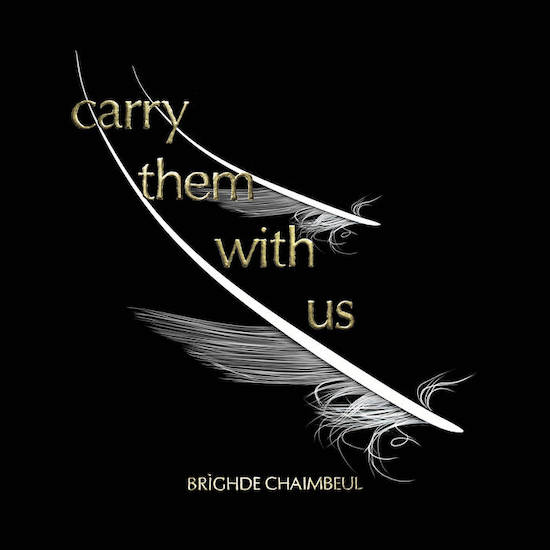Brìghse Chaimbeul has risen to prominence since her first album, 2019’s entrancing The Reeling, in a way that few Scottish pipers have achieved, including playing for world leaders at COP26 in Glasgow. Her instrument is the smallpipes, a more portable, practical version of the Great Highland bagpipes which also carry fewer cultural assumptions. Chaimbeul has brought Scottish piping to a new audience with her captivating style, which has affinity with psychedelic drone as well as the folk traditions of the north. On ‘Carry Them With Us’, she shows her complete confidence as a musician through a collaboration with saxophonist Colin Stetson, which was formed initially over Twitter during lockdown.
The album is mostly instrumental, but its tracks tell stories. ‘Banish the Giant of Doubt and Despair’, for example, is a reel that starts quick and spins out of control, reflecting the tale of the princess of an underwater kingdom and the giant of the Western Isles who cannot stop dancing to her song, faster and faster until he falls into the sea and drowns. Melodic cascades flow from Chaimbeul’s pipes as though she can barely restrain them, while a bass drone and subtle, breathy saxophone combine seamlessly to set the scene. Stetson, who has been in several bands including Arcade Fire and has worked with everyone from Anthony Braxton to Tom Waits, is a subtle musician. Despite the unconventional pairing of instruments, they often seem to make a single sound. After her collaboration with major Scottish folk scene figures ‘The Reeling’, she is branching out to make new sounds.
The result is an exciting, sometimes bewitching set of tunes. Some are improvised, the two musicians working together with consummate ease. On ‘Uguviu (ii)’, for example, the trance-like pipe drone nags at the back of the skull while pipes and horn duel over the top, somewhere in the clouds, exchanging repeating, minimal phrases. It is a complete world, gone before you know it. ‘Pilliù: The Call of the Redshank’ and ‘Pìobaireachd Nan Eun: The Birds’ are both inspired by the singing of birds. Chaimbeul’s singing, rarely heard on this album, is a delicate, intricate sound which demonstrates why she believes birdsong is close to to the Gaelic language. Traditional tunes tell of repetitive reality as well as wild myth. ‘That Fonn Gun Bhi Trom: I Am Disposed of Mirth’ is a waulking song, sung by Scots women as they beat cloth – repetitive work which spawned a genre of its own. It is music with rhythms as predictable and varied as the weave itself. Chaimbeul and Stetson make it flutter and break free from its earthy origins.
The album’s title is a quotation from Gaelic bard Iain Sheonaidh, of South Uist, who carried the old tales with him. Brìghde Chaimbeul, deeply immersed in her culture, is doing the same. At the same time she is making the tales new, by transforming them into some of the most satisfying and complete music to be found anywhere in these islands.


